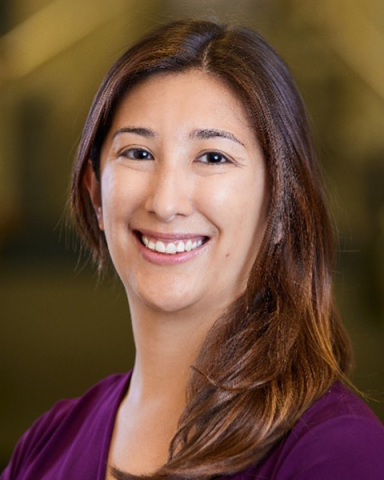
E. Sally Chang, M.A., Ph.D.
Incorporating bioinformatics approaches into biological research is not a small task, and researchers across NICHD face common hurdles. Time constraints, a lack of clear starting points, and uncertainty about how bioinformatics integrates into their work are some of the biggest barriers. Recognizing this, NICHD’s new Bioinformatics Training Program Manager, E. Sally Chang, M.A., Ph.D., is on a mission to make these essential skills more accessible.
“Acquiring bioinformatics expertise takes substantial, sustained practice,” Dr. Chang explains. “But for many researchers, it’s hard to carve out that time amidst other responsibilities. And even when they do, knowing where to begin—or how these skills apply to their research—can feel overwhelming.”
Her perspective comes from personal experience. During graduate school, she embarked on a self-taught bioinformatics journey that lacked the structured guidance now available to many. “That experience gave me a deep appreciation for how challenging it can be to learn these skills on your own,” she shares, “It also inspired me to help others navigate the process more effectively.”
In this new role, Dr. Chang addresses these challenges head-on. Her goal is to create a sustainable community of bioinformatics expertise within NICHD where researchers feel empowered to integrate bioinformatics into their work at any level—from interpreting research papers to performing complex analyses independently.
Creating Solutions for Researchers
To make this vision a reality, Dr. Chang is building a robust training program specified to address the practical research needs of NICHD researchers. This spring, she’ll launch the program’s first major offering: a comprehensive course on bulk RNAseq. “This course is designed to guide participants through every step of the process,” she explains, “from experimental design all the way to creating publication-ready figures. Over the course of two months, participants will gain hands-on experience and leave with the confidence to apply what they’ve learned directly to their research.”
The bulk RNAseq course will also serve as a foundation for shorter, focused workshops and classes on specific tools and techniques. Future courses could include using Biowulf, NICHD’s high-performance computing cluster, and creating figures in R, a powerful tool for data visualization.
Beyond these initial offerings, Dr. Chang is proactively planning for the future, emphasizing that bioinformatics is an ever-evolving field. A key part of her role is staying ahead of emerging trends and ensuring NICHD researchers are equipped with the skills needed to tackle future challenges.
Flexibility is another cornerstone of the program. Recognizing the diverse needs and schedules of NICHD researchers, Dr. Chang plans to offer a mix of in-person courses, virtual workshops, and self-study materials that accommodate different learning styles and and busy schedules of NICHD researchers.
A Personal Passion
For Dr. Chang, this role is more than a job—it’s a passion. “What excites me most is the opportunity to make a tangible impact,” she shares. “Knowing that I’ve helped someone understand a new concept or solve a problem feels incredibly rewarding, especially when it helps them achieve their research goals.”
Another highlight is the chance to engage with the diverse research happening across NICHD. “I get to learn about so many different projects and think creatively about how bioinformatics can support them,” she says. “It’s inspiring to see how this program can enable researchers to do even cooler science."
Dr. Chang also appreciates the variety their role offers. “Some days I’m deeply focused on developing curriculum; other days, I’m meeting with researchers to understand their needs. It’s a great balance that keeps me energized.”
What’s Next
As she settles into this new position, Dr. Chang is eager to connect with NICHD researchers to ensure the program meets their needs by chatting with people and diving into the survey results. For now, she’s focused on launching initial courses and building momentum, but the long-term vision is clear: a thriving community where bioinformatics knowledge is shared, accessible, and empowers research innovation.
“If we work together, we can lower the barriers to mastering these skills and open new doors for researchers and trainees alike,” Dr. Chang concludes. “I’m excited to be part of this journey with NICHD.”
